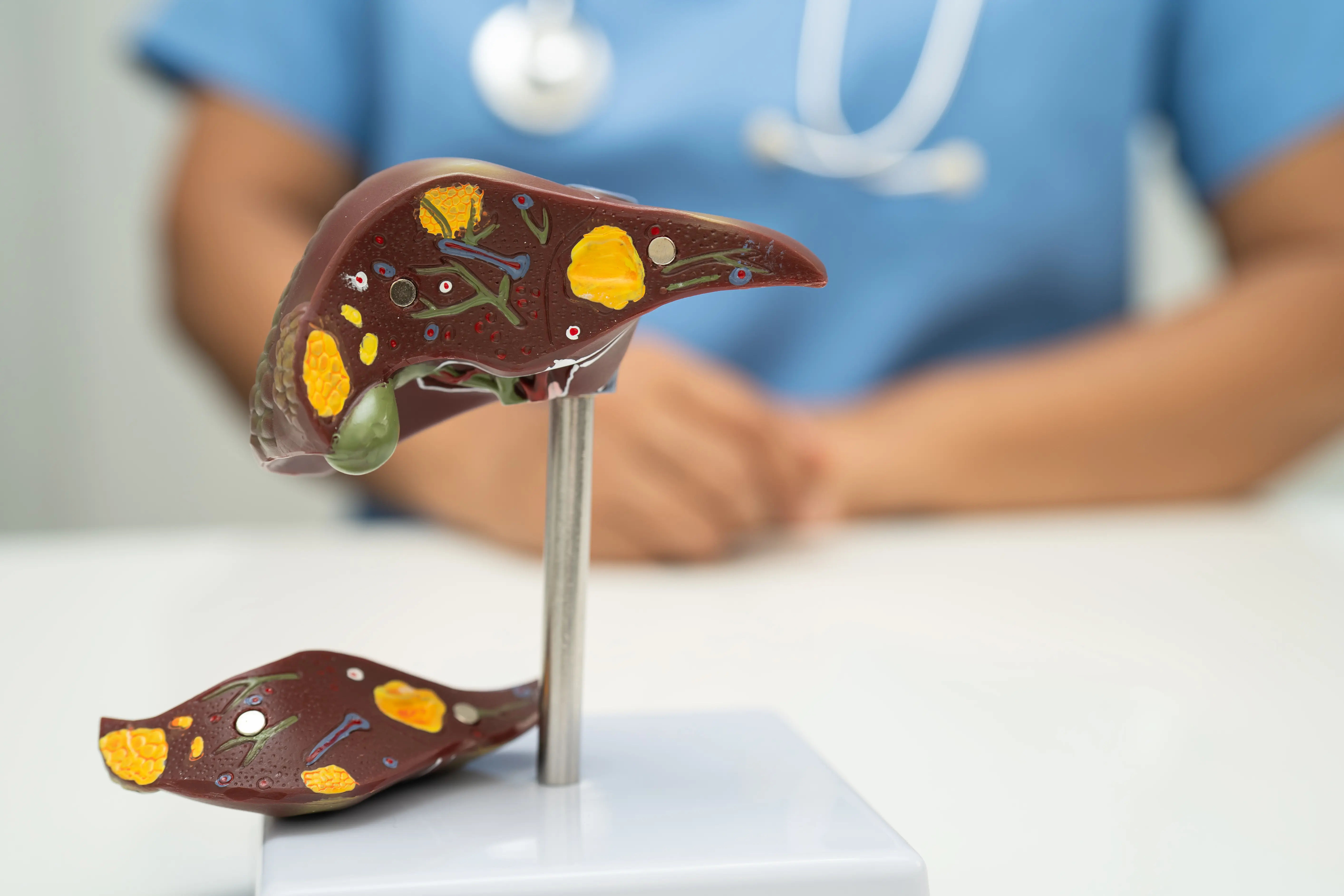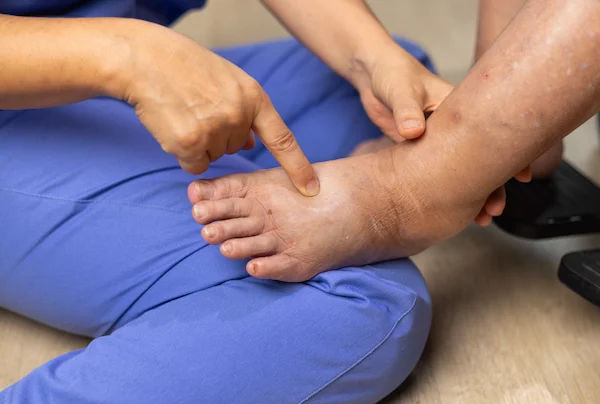Liver Cirrhosis: Overview of Symptoms and Treatment
Know about liver cirrhosis, causes, symptoms, diagnosis and treatment options. Learn how to keep your liver healthy.

Written by Dr. Mohammed Kamran
Reviewed by Dr. Dhankecha Mayank Dineshbhai MBBS
Last updated on 13th Jan, 2026
_2.webp?tr=q-80,f-webp,w-350,dpr-2,c-at_max 700w)
Introduction
The liver is one of the most vital organs in our body, responsible for filtering toxins, aiding digestion, and storing essential nutrients. However, when the liver gets damaged over time, it can lead to a serious condition called cirrhosis.
Cirrhosis occurs when healthy liver tissue is replaced by scar tissue, making it difficult for the liver to function properly. If left untreated, it can lead to liver failure. The good news is that early detection and proper treatment can help manage the condition effectively.
In this article, we’ll discuss the symptoms, causes, and treatment options for liver cirrhosis, along with lifestyle tips to support liver health.
What is Liver Cirrhosis?
Liver cirrhosis is a late-stage liver disease where healthy liver cells are permanently damaged and replaced by scar tissue. This scarring disrupts normal liver function, leading to complications like:
• Toxin buildup in the body
• Poor digestion due to reduced bile production
• Increased pressure in blood vessels around the liver
Cirrhosis develops slowly, often over many years, and early symptoms may be mild or unnoticed. However, as the condition worsens, symptoms become more severe.
Consult General Practitioner for Personalised Advice
Common Symptoms of Liver Cirrhosis
Early-stage cirrhosis may not show obvious signs, but as the disease progresses, symptoms may include:
Early Symptoms:
• Fatigue and weakness
• Loss of appetite
• Unexplained weight loss
• Nausea or vomiting
• Mild abdominal pain
Advanced Symptoms:
• Jaundice (yellowing of skin and eyes)
• Swelling in legs and abdomen (oedema and ascites)
• Easy bruising or bleeding (due to reduced clotting factors)
• Itchy skin (from bile buildup)
• Confusion or memory problems (hepatic encephalopathy)
• Red, spider-like blood vessels on the skin
If you notice any of these symptoms, it’s important to consult a doctor for proper diagnosis and treatment.
What Causes Liver Cirrhosis?
Several factors can lead to liver damage and cirrhosis. The most common causes include:
1. Chronic Alcohol Abuse
Excessive alcohol consumption over many years is a leading cause of cirrhosis. The liver breaks down alcohol, but too much can damage liver cells.
2. Hepatitis B and C
Viral infections like hepatitis B and C cause long-term liver inflammation, leading to scarring.
3. Non-Alcoholic Fatty Liver Disease (NAFLD)
This occurs due to fat buildup in the liver, often linked to obesity, diabetes, or high cholesterol.
4. Autoimmune Liver Diseases
Conditions like autoimmune hepatitis or primary biliary cholangitis cause the immune system to attack liver cells.
5. Genetic Disorders
Diseases like hemochromatosis (excess iron) or Wilson’s disease (copper buildup) can damage the liver over time.
6. Other Causes
• Long-term use of certain medications
• Repeated bile duct blockages
• Chronic heart failure affects liver blood flow
How is Liver Cirrhosis Diagnosed?
If your doctor suspects cirrhosis, they may recommend:
1. Blood Tests
• Liver function tests to check enzyme levels
• Complete blood count (CBC) to detect anaemia or infection
• Coagulation tests to assess blood clotting
2. Imaging Tests
• Ultrasound, CT scan, or MRI to examine liver structure
• FibroScan (a special ultrasound) to measure liver stiffness
3. Liver Biopsy
• A small liver tissue sample is taken to confirm scarring.
Early diagnosis helps in managing cirrhosis effectively. If you’re experiencing symptoms, book a liver function test through Apollo 24|7 for quick and accurate results.
Get Your Health Assessed
Treatment Options for Liver Cirrhosis
While cirrhosis cannot be reversed, treatment focuses on slowing disease progression and managing complications.
1. Medications
• Diuretics to reduce fluid buildup
• Beta-blockers to lower blood pressure in the liver veins
• Antiviral drugs (for hepatitis-related cirrhosis)
2. Lifestyle Changes
• Stop alcohol completely to prevent further damage
• Eat a balanced diet (low salt, high protein, and vitamins)
• Exercise regularly to maintain a healthy weight
3. Managing Complications
• Ascites (fluid retention): Limit salt and take prescribed diuretics
• Hepatic encephalopathy: Reduce protein intake and take lactulose
• Variceal bleeding: Endoscopic treatment to prevent bleeding
4. Liver Transplant
In severe cases, a liver transplant may be the only option.
How to Prevent Liver Cirrhosis?
Follow the below things:
1. Limit Alcohol Consumption
• Avoid excessive drinking to protect your liver.
2. Get Vaccinated for Hepatitis B
• Vaccination can prevent hepatitis-related cirrhosis.
3. Maintain a Healthy Weight
• Exercise and a balanced diet help prevent fatty liver disease.
4. Avoid Unnecessary Medications
• Some painkillers (like acetaminophen) can harm the liver if taken excessively.
5. Regular Health Check-ups
• Monitor liver health, especially if you have risk factors like diabetes or high cholesterol.
When to See a Doctor?
If you experience:
• Persistent fatigue or weakness
• Yellowing of skin/eyes
• Swelling in legs or abdomen
• Unexplained weight loss
Consult a liver specialist immediately. Early intervention can make a big difference.
Final Thoughts
Liver cirrhosis is a serious condition, but with timely diagnosis and proper care, its progression can be slowed. If you or a loved one is at risk, get tested early and follow a liver-friendly lifestyle.
Consult General Practitioner for Personalised Advice
Consult General Practitioner for Personalised Advice

Dr. Vivek D
General Physician
4 Years • MBBS
Bengaluru
PRESTIGE SHANTHINIKETAN - SOCIETY CLINIC, Bengaluru

Dr Syed Mateen Pasha
General Physician
2 Years • MBBS
Bengaluru
PRESTIGE SHANTHINIKETAN - SOCIETY CLINIC, Bengaluru

Dr. Anand Ravi
General Physician
2 Years • MBBS
Bengaluru
PRESTIGE SHANTHINIKETAN - SOCIETY CLINIC, Bengaluru

Dr. Syed Ismail Ali
General Practitioner
7 Years • MBBS
Hyderabad
Apollo 24|7 Clinic, Hyderabad

Dr. Madhuri Sai Sreepada
General Practitioner
9 Years • MBBS
Hyderabad
BRIGHT SMILES MEDICARE & DENTAL CARE, Hyderabad
Consult General Practitioner for Personalised Advice

Dr. Vivek D
General Physician
4 Years • MBBS
Bengaluru
PRESTIGE SHANTHINIKETAN - SOCIETY CLINIC, Bengaluru

Dr Syed Mateen Pasha
General Physician
2 Years • MBBS
Bengaluru
PRESTIGE SHANTHINIKETAN - SOCIETY CLINIC, Bengaluru

Dr. Anand Ravi
General Physician
2 Years • MBBS
Bengaluru
PRESTIGE SHANTHINIKETAN - SOCIETY CLINIC, Bengaluru

Dr. Syed Ismail Ali
General Practitioner
7 Years • MBBS
Hyderabad
Apollo 24|7 Clinic, Hyderabad

Dr. Madhuri Sai Sreepada
General Practitioner
9 Years • MBBS
Hyderabad
BRIGHT SMILES MEDICARE & DENTAL CARE, Hyderabad




